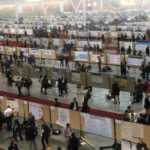Perhaps the biggest buzzword of 2020 has been pivot. It’s been used to describe changes in workflows, marketing strategies, business planning and, frequently, conferences and events. Like many organizations, state rheumatology societies have had to evaluate shifting circumstances during the pandemic and make tough decisions about their 2020 meetings. Some societies were able to hold in-person meetings early in the year, but others have canceled, postponed or transitioned their meetings to virtual formats.
“It’s been sort of a mixture,” says Joseph Cantrell, JD, ACR’s senior manager of state affairs, regarding state society responses. “Some canceled outright for the year, some moved their meetings to the end of the year in hopes of not having to forfeit any money to the venue and still maintain an in-person meeting, and some of them are looking at virtual options.”
These changes will have various effects on the societies and meetings, impacting speaker availability, attendance and revenue, he says.
State Societies Respond
The State of Texas Association of Rheumatologists (STAR) held its meeting Feb. 28–March 1, 2020, shortly before nationwide travel restrictions and stay-at-home orders were issued. The annual event hosts about 240 physicians and 25 practice managers, says Jeanne Torbett, CMP, CMMM, executive director of STAR. The 2020 STAR meeting “just made it under the wire,” she says. “We had a full conference with no problems.”
The North Carolina Rheumatology Association canceled its March 2020 meeting outright to protect public health, and the Georgia Society of Rheumatology held its meeting virtually in June.
Other societies have rescheduled for later in the year. The Florida Society of Rheumatology (FSR) annual meeting, originally slated for July, was pushed back to Aug. 28–30 and is scheduled to go on in person, with some tweaks. The meeting generally hosts about 325 physicians and 80 practice managers, as well as a group of residents, says Ms. Torbett, FSR executive manager. This year, in addition to the in-person event, FSR will provide virtual options for attendees and speakers. In some cases, sponsors are hiring third parties to staff tables.
Contingency Planning
The Arkansas Rheumatology Association moved its annual meeting from April to December. The group typically hosts several dozen medical professionals and combines a mix of clinical presentations, industry-sponsored meal programs, advocacy updates and a business meeting, says Michael Saitta, MD, association president. The group is tentatively planning an in-person meeting but making contingency plans for a virtual meeting. “December is a long way off, and we are taking this one day, one week at a time,” Dr. Saitta says.
The Arizona United Rheumatology Alliance (AURA) meeting, originally scheduled for June, is now slated for Dec. 4–6. The annual meeting hosts about 80 practicing rheumatologists, allied health professionals and researchers, says Kaleo C. Ede, MD, society president. Because it’s unclear what the rest of the year will bring, Dr. Ede and AURA leaders are considering whether they should pivot to a partially or fully virtual meeting.
“Obviously, changing the format to a virtual meeting will have significant implications on our ability to raise funds to host the meeting, as a large portion of our funding comes through industry sponsorship,” Dr. Ede says. “We will have to be creative and open-minded in developing a format that works for the speakers, attendees and our sponsors.”
Lasting Effects
Sponsorship and fundraising revenues are a significant aspect of in-person state society meetings, and the rash of cancellations will have an economic effect on the societies, Mr. Cantrell says.
“If those conferences don’t get held, then they don’t get registrations or sponsors, and that impacts their revenues,” Mr. Cantrell explains. “If this is something that continues into next year and continues to be a concern, it could pose a serious threat, especially to the smaller state societies.”
“I believe that once it is safe, state society meetings will resume in person, although perhaps in a modified form,” Dr. Saitta says. “The social and intellectual exchanges just aren’t quite the same in the virtual setting. … I consider those kinds of interactions to be vital in building a collective vision for the society and in furthering our advocacy goals to improve patient care and access.”
For a current list of state society meetings, see the ACR calendar of events.
Kimberly J. Retzlaff is a freelance medical journalist based in Denver.
